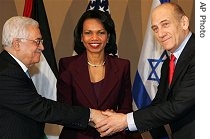-
(单词翻译:双击或拖选)
Jerusalem
19 February 2007
U.S. Secretary of State Condoleezza Rice says the summit in Jerusalem between Israeli Prime Minister Ehud Olmert and Palestinian President Mahmoud Abbas reaffirmed a commitment to a two-state solution in the Middle East. VOA's Jim Teeple reports from Jerusalem, the summit agenda was dominated by discussions of the new power-sharing agreement between the Palestinian factions2 Hamas and Fatah.
 |
| Secretary of State Condoleezza Rice, center, Israeli PM Ehud Olmert, right, and Palestinian President Mahmoud Abbas, left, shake hands at a meeting at a hotel in Jerusalem, 19 Feb. 2007 |
According to U.S. Secretary of State Condoleezza Rice, who mediated3 the meeting, both men used the talks as an opportunity to discuss the recent-power sharing agreement between Mr. Abbas' Fatah faction1 and Hamas. The agreement is supposed to result in a unity4 Palestinian government within several weeks.
"It is an accomplishment5 that it [the talks] happened, because, in this circumstance, with a change in the circumstances, I think, it is really valuable that they sat down face-to-face," said Condoleezza Rice. "I think it was helpful that I was there. It was useful that they could talk about what had changed and what had not changed, and what commitments Abu Mazen [Mahmoud Abbas] was making on the basis of his principles. I think that was extremely important to do."
Secretary Rice, who met informally with journalists before departing Israel late Monday, says Mr. Abbas, who is also known as Abu Mazen, used Monday's talks to reaffirm his commitment to the Roadmap peace plan, a three-stage series of negotiations6 and reciprocal concessions7 that is supposed to lead to an eventual8 Palestinian state living side-by-side with Israel. The plan is backed by the so-called Middle East Peace Quartet - made up of the United States, Russia, the European Union and the United Nations.
Israel says it will reject the new Palestinian unity government, if it does not recognize Israel, renounce9 violence or fully10 accept past peace agreements. Palestinians say the new government is necessary to stop factional fighting between Hamas and Fatah.
Secretary Rice says the international community should work with Palestinians to ensure that any new Palestinian government does meet those three conditions.
"It is going to be, I suspect, a process of coming to terms with differences that are quite black and white, and maybe going to gray at some point," she said. "What we have to do as the international community is stay clear about what is required. I think, if we stay clear about what is required, that increases the chance that the bulk of the Palestinian leadership will end up in a place that the international community can deal with."
Aides close to Mr. Abbas say they understand any future Palestinian government must accept all previous agreements and obligations in relations with Israel. But Hamas officials criticized Monday's summit, saying the power-sharing agreement already meets international concerns, and that sanctions that were imposed on the Hamas-dominated Palestinian Authority for its refusal to recognize Israel need to be lifted.
 收听单词发音
收听单词发音
1
faction

|
|
| n.宗派,小集团;派别;派系斗争 | |
参考例句: |
|
|
|
2
factions

|
|
| 组织中的小派别,派系( faction的名词复数 ) | |
参考例句: |
|
|
|
3
mediated

|
|
| 调停,调解,斡旋( mediate的过去式和过去分词 ); 居间促成; 影响…的发生; 使…可能发生 | |
参考例句: |
|
|
|
4
unity

|
|
| n.团结,联合,统一;和睦,协调 | |
参考例句: |
|
|
|
5
accomplishment

|
|
| n.完成,成就,(pl.)造诣,技能 | |
参考例句: |
|
|
|
6
negotiations

|
|
| 协商( negotiation的名词复数 ); 谈判; 完成(难事); 通过 | |
参考例句: |
|
|
|
7
concessions

|
|
| n.(尤指由政府或雇主给予的)特许权( concession的名词复数 );承认;减价;(在某地的)特许经营权 | |
参考例句: |
|
|
|
8
eventual

|
|
| adj.最后的,结局的,最终的 | |
参考例句: |
|
|
|
9
renounce

|
|
| v.放弃;拒绝承认,宣布与…断绝关系 | |
参考例句: |
|
|
|
10
fully

|
|
| adv.完全地,全部地,彻底地;充分地 | |
参考例句: |
|
|
|















